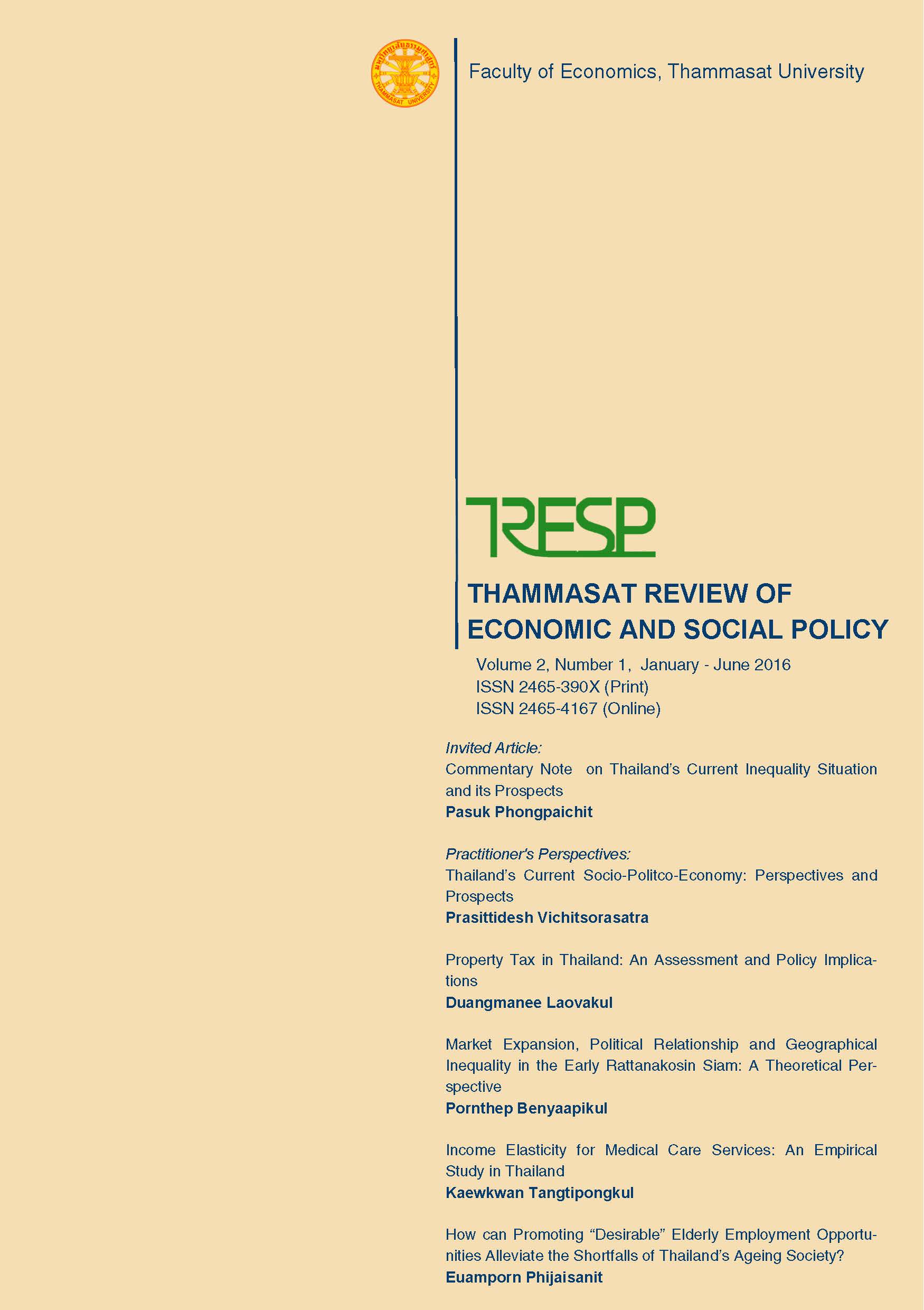Commentary Note on Thailand’s Current Inequality Situation and Its Prospects
DOI:
https://doi.org/10.14456/tresp.2016.1References
Acemoglu, D. (2008). Oligarchic versus democratic societies. Journal of the European Economic Association, 6(1), 1-44.
Acemoglu, D., & Robinson, J. A. (2006). Economic origins of dictatorship and democracy. Cambridge University Press.
Acemoglu, D., Ticchi, D., & Vindigni, A. (2008). A theory of military dictatorships (No. w13915). National Bureau of Economic Research, 1-42.
Acemoglu, D., & Robinson, J. (2012). Why nations fail: the origins of power, prosperity, and poverty. Crown Business.
Aghion, P., Caroli, E., & Garcia-Penalosa, C. (1999). Inequality and economic growth: the perspective of the new growth theories. Journal of Economic literature, 37(4), 1615-1660.
Alesina, A., & Rodrik, D. (1994). Distributive politics and economic growth (No. w3668). Quarterly Journal of Economics, 109, 465-490.
American Political Science Association (2013). Inequality and Democratization: What Do We Know?. Comparative Democratization 11 (3), 1-42.
Berg, A., Ostry, J. D., & Zettelmeyer, J. (2008). What makes growth sustained?. (No. 08/59). International Monetary Fund
Berg, J. (Ed.). (2015). Labour Markets, Institutions and Inequality: Building Just Societies in the 21st Century. Geneva:International Labour Office.
Cripps, Francis. (2016). “A National Accounting Perspective on Thai Government Income and Expenditure, 1990-2013. A note prepared for the project “Guidelines for Reform of the Personal Income Tax (PIT) for Effective Implementation and Analysis of Income Distribution at the Upper End of the Income Scale in Thailand”, a research funded by the Thailand Research Fund, 2016- 2017.
Epstein D, L., Robert B., Jack G., Ida K., and Sharyn O’ H. (2003). Democratic Transition, Draft of April 2, 2003, from http://politics.as.nyu.edu/docs/IO/4753/epstein.pdf
Lathapipat, D. (2016). Inequality in Education and Wages, In Unequal Thailand: Aspects of Income, Wealth, and Power [edited by Pasuk Phongpaichit and Chris Baker], 32–42. Singapore: NUS Press
Laovakul, D. (2016). Concentration of Land and Other Wealth in Thailand [Edited by Pasuk Phongpaichit and Chris Baker], Unequal Thailand: Aspects of Income, Wealth, and Power, 32–42. Singapore: NUS Press.
Li, H., & Zou, H. F. (1998). Income inequality is not harmful for growth: theory and evidence. Review of development economics, 2(3), 318-334.
Ostry, J. D., & Berg, A. (2011). Inequality and unsustainable growth: two sides of the same coin? (No. 11/08). International Monetary Fund.
Mayer, J. (2016). Dark Money: The Hidden History of the Billionaires Behind the Rise of the Radical Right. New York: Doubleday.
Phongpaichit, P. & Baker, C. eds. (2016). Unequal Thailand: Aspects of Income, Wealth and Power, Singapore: NUS Press.
Phongpaichit, P. (2016). Inequality, Wealth and Thailand’s Politics, Journal of Contemporary Asia, Special Issue, 2016. On line available, February 2016. Hard copy end of 2016.
Perotti, R. (1996). Growth, income distribution, and democracy: what the data say. Journal of Economic growth, 1(2), 149-187.
Persson, T., & Tabellini, G. (1994). Is inequality harmful for growth?. The American Economic Review, 600-621.
Piketty, T. (2014). Capital in the twenty-first century. Harvard University Press.
Pootrakul, K. (2013). Khunaphap kan charoen toepto jak miti khong kan krajai raidai panha lae thang ook, [The quality of growth from the perspective of income distribution: problems and solutions]. Paper presented at the Bank of Thailand annual seminar, 19 September.
Wilkinson, R., Pickett, K., & Cato, M. S. (2009). The spirit level. Why more equal societies almost always do better. Allen Lane and Democracy.
Winters, J. A. (2011). Oligarchy. Cambridge University



